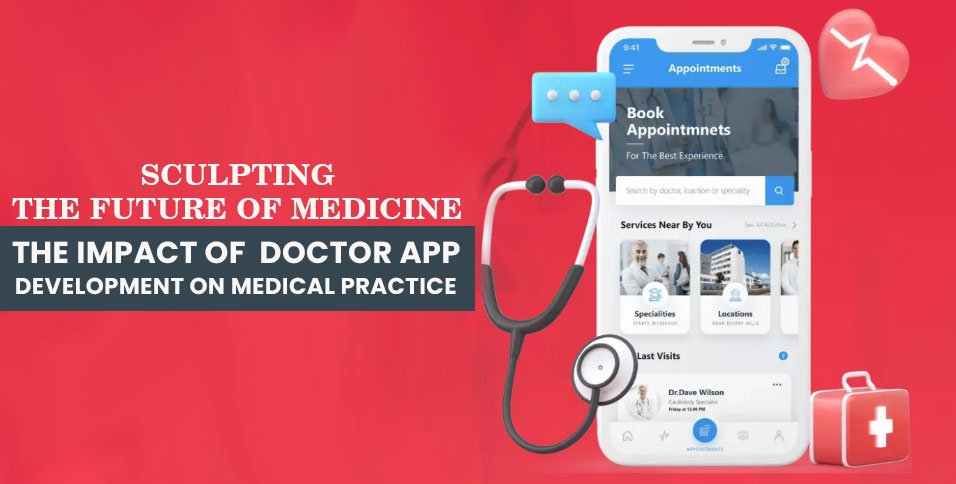Welcome to the digital frontier of healthcare, where the convergence of medicine and technology is not just a trend but a revolutionary force. In this era of constant innovation, one aspect that stands out is the development of doctor apps, spearheading a transformation in medical practices. Let’s delve into how these applications sculpt the future of medicine.
Breaking Ground: The Evolution of Doctor App Development
In the not-so-distant past, a visit to the doctor’s office involved stacks of paperwork, endless waits, and a tangible air of uncertainty. Enter the age of doctor app development, where the mundane is traded for the extraordinary. These apps are redefining the healthcare experience.
From appointment scheduling to electronic health records (EHRs), doctor apps are intuitive platforms that have helped streamline the once-clunky gears of medical administration. They now serve to bridge the digital gap between hospitals and patients while also promoting cohesiveness between doctors, nurses, and administrators.
From Stethoscope to Smartphone
These apps transform smartphones into personalized health hubs, empowering patients to participate in their well-being actively. The once-elusive concept of preventive healthcare becomes a daily reality as patients track vitals, receive medication reminders, and access a trove of medical knowledge at their fingertips.
From offering remote consultations, instant messaging for medical queries, and real-time health monitoring — these futuristic dreams are now tangible realities. By the courtesy of healthcare app development services.
Streamlining Workflows: A Symphony of Efficiency
Doctor apps integrate with existing hospital systems, creating a unified platform where information flows effortlessly. It’s akin to having a personal assistant who ensures that everything is in its right place, sparing healthcare professionals from the burdensome administrative tasks that often consume their valuable time.
Diagnostics in the Digital Age: Precision at Your Fingertips
Picture this: a doctor examining a patient, and with a few taps on their tablet, they have access to a plethora of diagnostic tools. Doctor apps are not just about managing schedules; they are key players in the diagnostic revolution.
How do doctor apps enhance diagnostics?
These applications integrate with medical databases, leveraging artificial intelligence (AI) to analyze symptoms and provide instant insights. It’s like having a medical encyclopedia combined with the analytical prowess of a supercomputer in the palm of your hand. Rapid diagnostics lead to quicker decision-making, ultimately improving patient outcomes. Helping save more lives in the process.
VR In Doctor App
Virtual Reality isn’t reserved for gamers alone. Enter the operating room of the future, where surgeons don VR headsets to practice procedures in a digital realm before laying a hand on a patient. This isn’t science fiction; this is the innovative frontier of medicine by any VR app development company.
Medical students are stepping into virtual cadaver labs, honing their skills in a risk-free environment. It’s not about replacing reality; it’s about enhancing education and training, ensuring that every incision is a confident one.
The Anatomy of Success: Doctor App Development Companies
Now, you might wonder, who are the maestros orchestrating this symphony of innovation? Enter the stage of a doctor app development company, the unsung heroes of modern healthcare.
Crafting the Future
These companies are not just code-slingers; they are architects of change. Armed with a fusion of medical expertise and technological prowess, they sculpt healthcare apps that transcend the mundane, creating platforms that are not just tools but extensions of medical practitioners.
Navigating the Terrain: A Comprehensive Guide
For those eager to venture into the realm of doctor app development, it’s essential to have an idea of the do’s and dont’s. Consider this your guide, a roadmap through the twists and turns of this digital terrain.
Key Considerations
- User-Centric Design: At the heart of any successful doctor app lies am intuitive user interface. In the medical realm, simplicity is not just a preference; it’s a necessity. User-centric design ensures that doctors and patients can navigate the app seamlessly.
- Security Fortifications: With sensitive patient data at stake, security is non-negotiable. Doctor app development must prioritize robust encryption and compliance with healthcare data protection standards.
- Interoperability Integration: In a world where healthcare ecosystems are diverse, interoperability is the bridge connecting different platforms. Ensure that your app can seamlessly integrate with existing hospital systems and other healthcare apps.
Best Practices
- Agile Development: The healthcare landscape is dynamic, and so should your development approach. Agile methodologies ensure quick adaptability to evolving medical practices, technological advancements, and ever-changing user demands.
- Continuous Feedback Loop: Collect feedback from doctors, nurses, and patients. Analyze their pain points and use the insights to (re)iterate your process and doctor app to be more effective, user-friendly, and better meet the needs of your app users.
The Rise of Wearables: Maximizing The Potential Of Doctor Apps
As we stand on the precipice of a new era in healthcare, it’s evident that the canvas of doctor app development is far from static. The future promises even more innovations, challenges, and opportunities as technology continues to advance and intertwine with medicine.
Doctor apps are extending their reach beyond smartphones and tablets with the help of wearable technology. From smartwatches monitoring vital signs to augmented reality devices aiding in surgical procedures, the integration of wearables into healthcare is a testament to the ever-expanding potential and application of doctor apps.
Wearables provide real-time data, allowing for continuous monitoring of patient health. This data seamlessly integrates with doctor apps, creating a comprehensive picture of a patient’s well-being. It’s like having a constant companion, whispering insights into a healthcare provider’s ear, ensuring proactive interventions and personalized care.
The Ethical Frontier: Balancing Innovation and Responsibility
With great technological power comes great ethical responsibility. The evolving landscape of doctor app development raises ethical questions about data ownership, algorithmic bias, and the potential commodification of healthcare.
Regulatory bodies, technology developers, and healthcare professionals are engaging in ongoing dialogues to establish ethical guidelines for the development and deployment of doctor apps. Transparency in algorithms, patient consent frameworks, and responsible data stewardship are becoming integral components of this ethical frontier.
Conclusion: A Masterpiece in the Making
Doctor app development is emerging as a brushstroke that adds depth, precision, and connectivity. As we navigate this evolving landscape, one thing is clear: the impact of these applications extends far beyond the confines of a digital screen. They are sculpting a future where medicine is not just a practice but a dynamic, personalized, and accessible experience for all.















